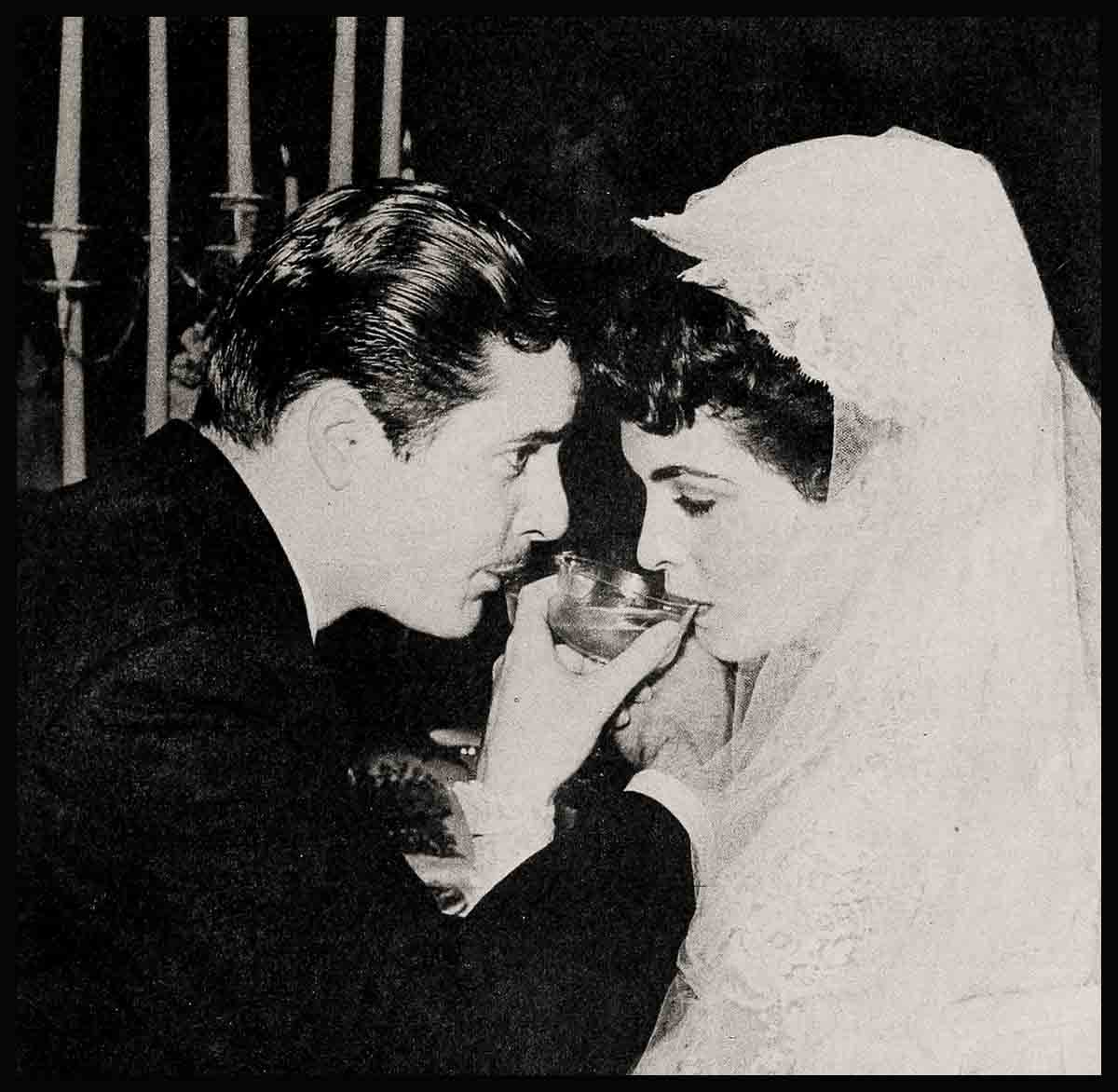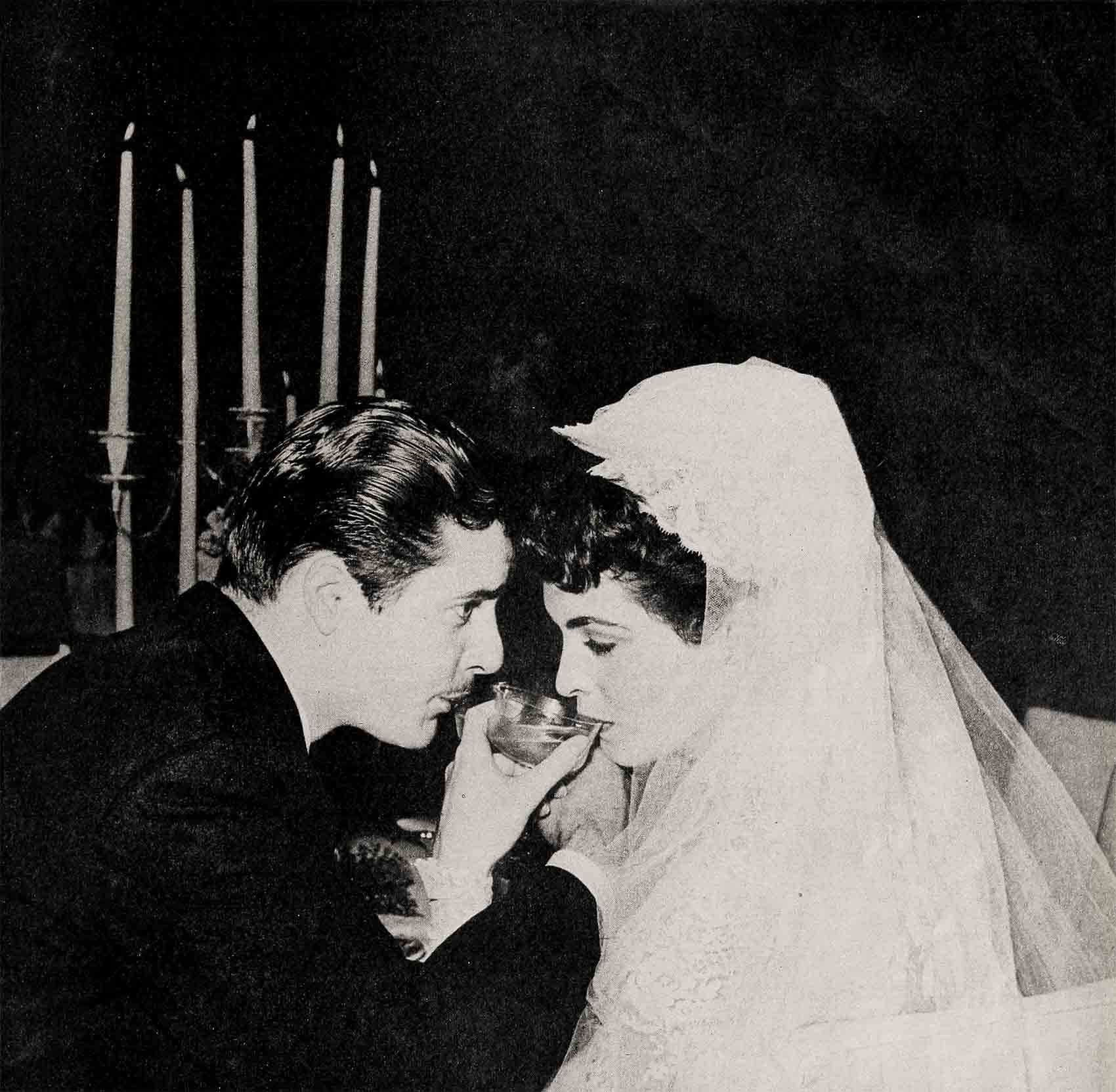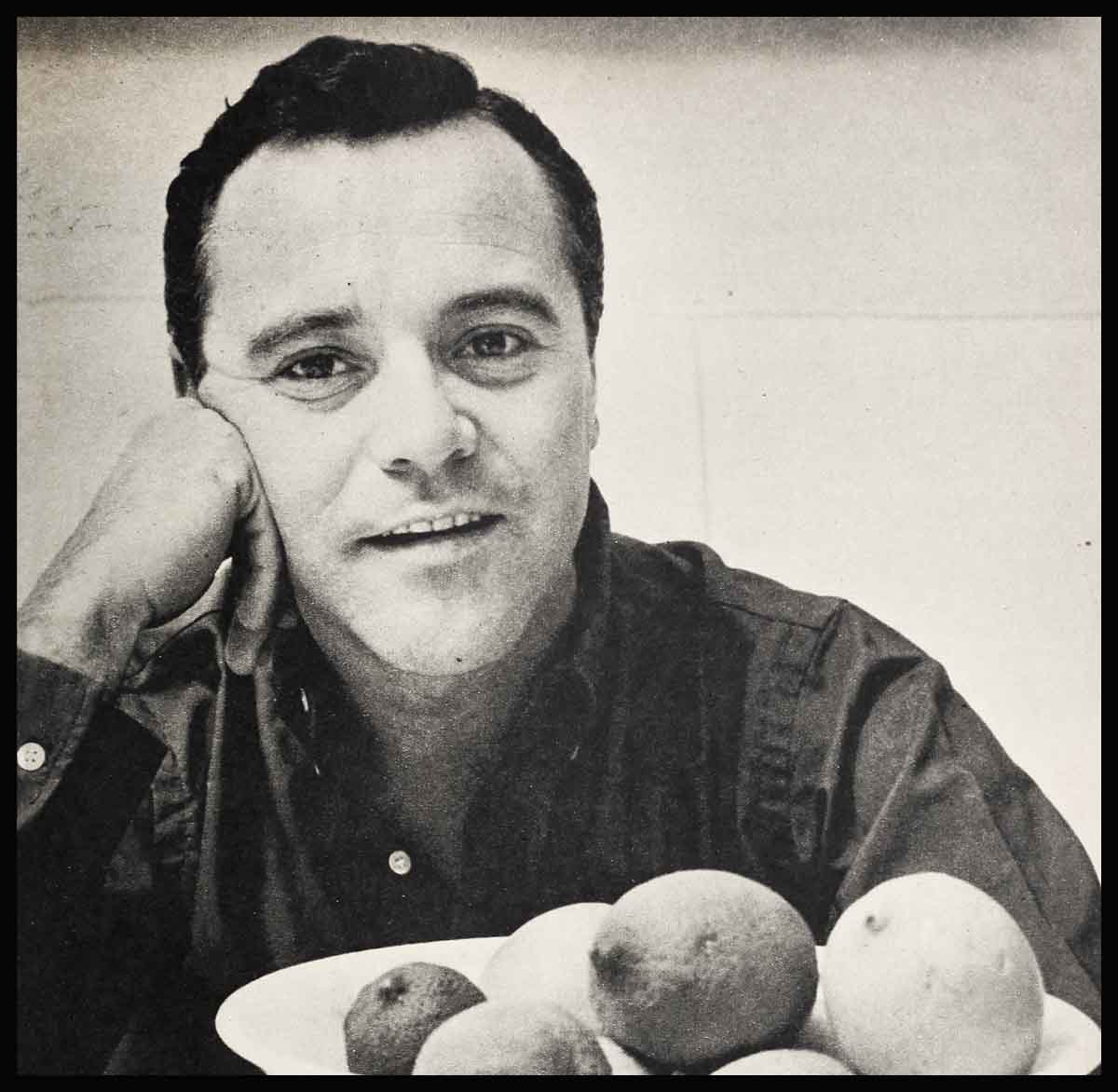
No Time For Tears—Suzanne Ball
There are always some who will cry at a wedding. But when Suzan Ball, as nervous and triumphant as a child taking her first steps, chose to make first public use of her artificial leg to walk down the aisle at her wedding the eyes of all two hundred guests at the El Monticido Presbyterian Church in Santa Barbara, filled with tears.
Yet an old studio friend of the bride and the bridegroom (Dick Long) even in her weeping, whispered to a companion, “There shouldn’t be any crying here. The kids have never done any crying. If everyone knew the whole story, the real story, of Suzan’s fight and her victory, they’d be cheering!”
Only three months before, Suzan, still hopeful after a year and a half of fighting to cure cancer of the bone in her right knee without amputation, heard the final shocking news. She had lost. Efforts to effect a cure by modified surgery and bone-grafting had failed. Still two months short of her twenty-first birthday, Suzan fought back hysteria and told herself that her most important job was to have no truck with self-pity, and to try to make sense, and even happiness, out of her life as she would now have to live it. And this is the victory of Suzan Ball. She has baited the future with new and deeper interests, and has gotten exciting nibbles in return.
It wasn’t easy. Suzan was presumably convalescing when her physician, Dr. Francis Engleman, told her that the condition of the leg made amputation imperative and no time was to be lost. Dick was at her bedside when the surgeon made his report before leaving for the night. When another doctor confirmed the diagnosis, Suzan telephoned Dr. Engleman and told him he could operate in the morning if he wished.
Then she and Dick looked at each other.
“Do you want to talk about it?” he asked.
“No,” said Suzan.
“Then let’s don’t,” he said.
He reached for a deck of cards and began to deal gin rummy hands. They played till a nurse came with a sedative.
H. Dale Ball, Suzan’s father, who had to give legal consent to the operation since Suzan Was not yet twenty-one, had just arrived on her hospital floor early the next morning, when she was wheeled past him on her way to the operating room. She Was wrapped in blankets and wore the green skull cap used for surgery patients. He had time only to call her name. She replied, “Hi, Dad! Dig this crazy hat!”
No, it wasn’t a bit easy to make all the adjustments. When she came swimming up into full consciousness from the anesthesia to look at Dick, and to realize that she was an amputee, the thrust of proud girlhood (or she admits it might just have been desperation) caused her to say:
“Dick, it’s over. I don’t expect you to Marry me now. You don’t have to.”
He stared at her for a moment as if she Were a stranger—and she wondered if she were going to be. Then he spoke calmly. “You’re an idiot,” he said.
He told her that he had fallen in love with her and not with her leg. These weren’t just words. Suzan was on crutches the first time he ever saw her, when they met in the commissary at Universal-International nearly two years ago. Her knee, injured in a dance rehearsal, was refusing to heal, and when he asked her what was wrong she told him cancer was suspected.
It was one of the things he reminded her of at the hospital when he declared the operation would make no difference in their relationship. There were other reasons, which had their basis in their feelings about each other and which need not be repeated here, but when they had finished talking it was clearly established that their life together was just beginning, not ending.
Suzan knew that her job from then until the date of their wedding was to regain her strength, attend rehabilitation school and learn to walk again—with an artificial leg—and to match her physical improvement with a proper mental attitude. But there was one thing she hadn’t anticipated when she began to appear in public on crutches. People stared. And Suzan burned.
Eventually, she asked the advice of Boni Buehler, the airline hostess who became a double amputee when she fell off a speed boat at Lake Arrowhead last year and got afoul of the craft’s propeller. Suzan met her at the rehabilitation school.
“What do you do when you catch people staring at you?” Suzan asked.
“There is nothing you can do to stop them,” Boni said. “Your job is to ignore them—to make sure you don’t see them staring.”
It seemed like no advice at all and yet she found in time that it was possible to blind herself to such rudeness.

Suzan had imagined that the process of being measured for an artificial leg and being trained in its use, would be a phase of her life into which Dick would not enter. But that is not the way it worked out. It was not the way it should work out, they both realized. Dick surprised her by his interest in her training. He went to the school with her and took her to the prosthetic company where the artificial limb was to be made. On one of these visits, he gave Suzan’s morale a tremendous boost. An attendant passed by and Dick whispered to Suzan that he was sure this man was an amputee.
Suzan looked at the fellow who walked smoothly and, even while she watched, scooted rapidly up some stairs. She could see no indication at all that Dick was right, and she said so. Dick promptly called another attendant and asked him about the man in question.
“Hasn’t that fellow got an artificial leg?”
“Oh, him?” came the reply. “He’s got both of them off!”
“How did you know about him?” Suzan asked Dick later.
He looked at her, half incredulous. “Why, I’ve been watching for amputees and I’m probably an expert at telling when I see one now,” he told her. “I love to see them going about their business and their life like nothing has happened as you and I will go about ours.”
They did go about their business. They talked about their wedding plans, their honeymoon, the sort of house they wanted. One would expect a sad note to creep into their talk, but the reverse was generally true. This spirit spread to their friends and made for warmer relationships.
When Suzan did get her artificial leg, both she and Dick felt oddly as if it were an increase in their family even before their marriage. They decided to christen the leg. It is now known as Throckmorton.
In various ways Throckmorton is beginning to develop a personality of his own. He has the tremors occasionally; he has a tendency to reveal himself in immodest proportions and in full gait he has a wicked swagger. More delicately fashioned than most people realize, he refuses to be forced into his duties but responds quickly and gracefully when the persuasion is smooth and rhythmical. Suzan had to learn all these things before she could trust herself to Throckmorton at the wedding. That she did learn them became known to the whole country through the news pictures of the event.
Guests at the wedding, incidentally, may have noted that they heard none of the “Because” or “I Suzan and Dick had plays at one of their favorite haunts in the valley, to play songs they had always loved: “Birth Of The Blues,” “My Funny Valentine,” the love theme from Romeo And Juliet and “Che Gelida Manina” from La Boheme.
They decided; too, that only a “no walk” honeymoon would be sensible for them, meaning that they would not go where it would be necessary to walk around to see the sights. It seemed wiser to choose resorts they could reach and leave by car with no need to promenade in between.
“For one thing, it would be silly for us to spend money right now,” said Suzan, “since we are planning to buy a house and no place on earth would be as interesting to us as our own place. So why, really, go anywhere?”
For the new house Suzan will be ready with some new furniture, some left to her by her grandmother, including an eighteenth century wall clock, and a crowded apartment full of presents. One of the first wedding gifts to arrive was a pair of Steuben glass dishes from Ann Blyth and Dr. James McNulty, who wrote: “With love and all good wishes for a lifetime of happiness together.”
In addition to her rehabilitation course, and a physical buildup program supervised by her nurse, Mrs. Kaye Biddle (also her matron of honor), Suzan assumed the job of personally writing the hundreds of messages and thank-you notes necessary. But the Thursday before the weekend of her marriage she wasn’t one letter behind. “And I don’t want to be because I want nothing on my mind on my wedding day but my wedding,” she announced.
Suzan had her engagement ring only a few weeks before she became Dick’s wife. It took so long to get it because he had gone to special pains to have an unusual objet d’art designed. It consisted of two separate platinum bands connected by a diamond, and with a space left open between the bands into which the wedding ring fitted. The wedding ring itself was platinum with sapphire baguettes.
At noon on her wedding day, with the wedding set for four o’clock; the calmness which had won praise from everyone suddenly left Suzan.
“I’m terribly nervous. I don’t know what to do,” she told her nurse and her mother, Mrs. Marleah Ball.
“Do you think it is really nerves or just stage fright?”
It was just stage fright. At the appointed hour Suzan was at the church getting into her wedding gown, a creation designed by Bill Thomas. It was made of rose point lace (imported from France) over ruffled petticoats of pink chiffon. This had been delivered by special Cadillac from the studio, since it could neither be folded nor compressed in any way, much less packed.
In the church when Suzan began her walk down the aisle on the arm of her father, were relatives and close friends from the studio. Among the guests were Julia Adams, Lori Nelson, Barbara Rush, Mala Powers, Jeff Chandler, Tony Curtis, Jeff Hunter, Rock Hudson and many more of Hollywood’s younger set.
Outside there were more than 500 people. But these, too, heard the ceremony because of the foresight of the minister, Rev. Paul M. Gamons. Under the satin pillow at the altar he had placed a microphone which connected with a loud speaker outside. Besides that, he tape-recorded the rites as a surprise gift for the pair.
Dick’s younger brother, Philip Long, was best man. Another brother, Robert, and Marshall Thompson, who is Dick’s brother-in-law, were the ushers.
When the ceremony was over and Suzan came walking up the aisle on the arm of her new husband, her old studio friend who had said everybody should have cheered instead of wept, divulged an extraordinary bit of news.
“She didn’t want anybody to know beforehand, but Suzan has had her artificial leg only six days,” she said.. “Everyone from her doctor to her milkman warned her not to do this. That’s why she got nervous today. They didn’t reckon on her spirit. Look at her!”
Everybody was looking at her. When she got outside the crowd did exactly what the woman from the studio had thought fitting. They cheered and broke into spontaneous applause. An hour later, Suzan entertained a small group of guests at a dinner party. Her surgeon, Dr. Engleman, gave an impromptu piano concert. Suzan sang. There was constant bright chatter with everyone recalling little incidents about the ceremony or coming up with belated pieces of information. Two of these were especially interesting to Suzan.
Somebody commented that they liked the way her hair curled on her forehead. Suzan beamed and said she was rewarded for fooling with her curls all week to get them to fall just right.
Someone else said that a part in a picture once offered to her, the role of an Indian girl in The Long Hunters by Robert Buckner, was still open. Suzan got excited and waved a hand to show her enthusiasm. “Keep that open for me until I get back from my honeymoon,” she cried. “Because I’m still interested!”
THE END
—BY LOUIS POLLOCK
It is a quote. MODERN SCREEN MAGAZINE JULY 1954





No Comments